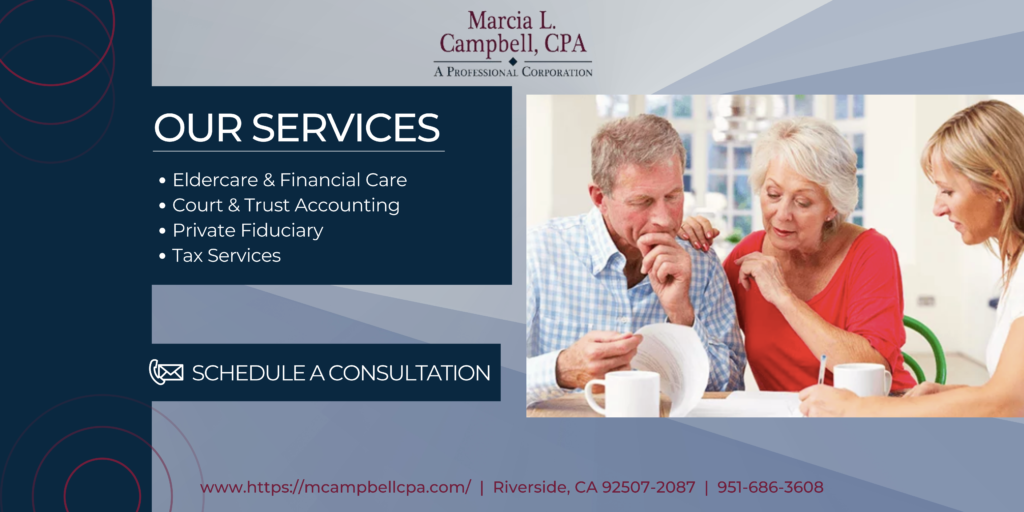
At Marcia L. Campbell CPA, we have helped countless children monitor and manage their elderly parents’ finances for decades. Our passion is providing peace of mind to children and financial security to their senior loved ones. Here’s how to monitor senior parents’ finances!
How Do I Monitor My Elderly Parents’ Finances?
From obtaining the legal authority necessary to take on this monumental task to working with a professional, there are several steps you need to take. So, without further ado, let’s get into it!
Related Article: How to Talk to Siblings About an Aging Parent’s Care & Finances
Help Your Parents or Obtain the Legal Authority
The first step to take in monitoring your parents’ finances is assisting your parents in estate planning. If they need extensive help, you may need to consider gaining the legal authority to make financial transactions and decisions on their behalf.
This is also one of the most effective ways of protecting your parents against scams and fraud. Remember, just because you have your parents’ login credentials for their financial accounts doesn’t mean you can legally access them.
Several tools exist that can be essential to answering the question: How do I monitor my elderly parents’ finances? The most effective include:
- Setting up a trust: A trust can be a great way to not only protect your parents’ assets but also help manage and oversee their finances. Have your parents work with an attorney to set up a living trust and name a trustee. This trustee will manage and oversee all accounts and property in the trust, help with budgeting, and even make your parents’ assets and savings more profitable in the long run, which can help ensure that they stay on top of financial obligations and don’t fall victim to scams or fraud. When you’re the trustee, you’ll have to file annual financial reports detailing how you managed the trust.
- Setting up a power of attorney (POA): A POA gives someone the power to act on another person’s behalf. A POA is often used as a precautionary measure. If your parent becomes incapacitated, a POA could kick in and give you the authority to make crucial health and financial decisions on their behalf. However, they can also use a POA to give someone the ability to oversee a specific bank account to help monitor financial transactions. They can also create a POA for a specific window of time. For example, if your parents want to spend their retirement traveling the world for months at a time, they can give someone the ability to monitor their finances and stay on top of all their financial responsibilities while they’re gone.
- Getting a court-appointed conservator or guardian: If your parents are already incapacitated and haven’t appointed a POA, this is no longer an option. You will have to petition the court to be named their conservator or guardian, which is thousands of dollars more expensive than creating a POA proactively. As a conservator or guardian, you will also have to file annual financial reports detailing how you managed their money and assets.
Whether you are using a trust, POA, or a conservatorship to manage your parents’ money, this is a time and labor-intensive responsibility that requires considerable knowledge of probate law and extensive financial acumen. Using their assets, you will have to:
- Pay their bills
- Monitor monthly statements
- Help with budgeting
- Oversee their financial planning
- Manage all income and expenses
- Stay on top of insurance and benefits programs
- Make their assets and investments more profitable
- And more
Clearly, this is a full-time job, and you need to appoint a professional fiduciary for the elderly as the trustee, POA, conservator, or guardian for your peace of mind and your parents’ financial security. Without their expertise, you could do more harm than good in the long run.
Related Article: Private Fiduciary for the Elderly: How They Work
Inform Financial Institutions of Your Status
After you have appointed a fiduciary to serve as a professional trustee, power of attorney, conservator, or guardian, you need to provide proof to their financial institutions that the fiduciary can act on their behalf. Sometimes, you might experience resistance from financial institutions.
In many cases, bringing your parents with you to these appointments is a good way to reassure any financial institution that your parents have made this decision of their own volition and it is in their best interest.
Related Article: How to Prepare for Taking Over Elderly Parents Finances
Inform Government Agencies of Your Status
You also want to notify the necessary government agencies of this change. The fiduciary will likely need to fill out forms to manage their benefits.
Medicare has a form to appoint an authorized representative, and the fiduciary will need to apply with the Social Security Administration to become a representative payee to manage your parents’ benefits. If your parents have veterans’ benefits to manage, the fiduciary will take action to gain that authority, too.
Related Article: How Do I Talk to My Parents About Their Spending Habits?
Gather Details About, Streamline, and Monitor Their Finances
With your parents’ designated fiduciary, start getting as much information about your parents’ finances as possible. This step is, in some ways, one of the most important.
You and the fiduciary will need tax returns, mail, wallets, bank and credit card statements, and checkbooks if necessary. Take inventory of items like their sources of income, investments, debts, real estate holdings, property, and personal items of value.
Once you have gathered all of the necessary personal information and documents, use them to create one list of financial accounts and one list of bills. With this information, a fiduciary will then work to streamline your parents’ finances to make managing them easier. This will include:
- Consolidating accounts and credit cards.
- Setting up automatic bill payments.
- Signing up for credit and identity monitoring.
- Turning on account alerts.
- Creating a “my Social Security” account.
- Freezing their credit reports to prevent new accounts from being opened.
- Eliminating duplicate or unused services and subscriptions.
- Monitoring their mail.
- Limiting spending.
- Blocking spam calls
Related Article: How Do You Talk to an Aging Parent About Finances? Pt. I
Keep Good Records & Plan Ahead
Another huge component of managing and monitoring your elderly parents’ finances is maintaining good records. Ultimately, this is where the financial expertise of an accountant, such as a fiduciary, is a tremendous asset.
The person managing their finances must maintain a thorough and exhaustive list of expenses, avoid paying with cash for their expenses (unless they keep receipts for it all), provide your parents with a spending allowance and record each distribution, negotiate with creditors, keep notes of all withdrawals and reasons for withdrawals, and more.
If you choose to take on this responsibility alone, you will also need to file tax returns, manage their Medicare benefits, help them enroll in more benefit programs they qualify for, help them get long-term care, and prevent financial exploitation. And this is just scratching the surface.
“Clearly, monitoring your parents’ finances is a full-time job, and you probably already have one of those. It also requires a great deal of specialized knowledge. To add further complication, the margin of error can be slim. For example, if your parents receive government benefits, it is imperative to have a deep understanding of how they work because one wrong move can impact their eligibility for benefits like Medicaid. So working with a professional is crucial to their long-term well-being and quality of life.”
– Marcia L. Campbell, CPA & Professional Fiduciary for the Elderly
Related Article: What Are the Financial Needs of an Elderly Person? Pt. I
Do You Need Help Monitoring and Managing Your Parents’ Finances? Schedule a Consultation Today!
So, now you know the answer if you were wondering, How do I monitor my elderly parents’ finances? You can attempt to take on this responsibility alone. But if you already have a job, a family, and other personal and professional obligations and goals, it is unfeasible to juggle it all. Plus, without the financial acumen and legal knowledge this role requires, you could end up doing more harm than good. Schedule a consultation for expert help monitoring and managing your parents’ finances!


